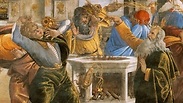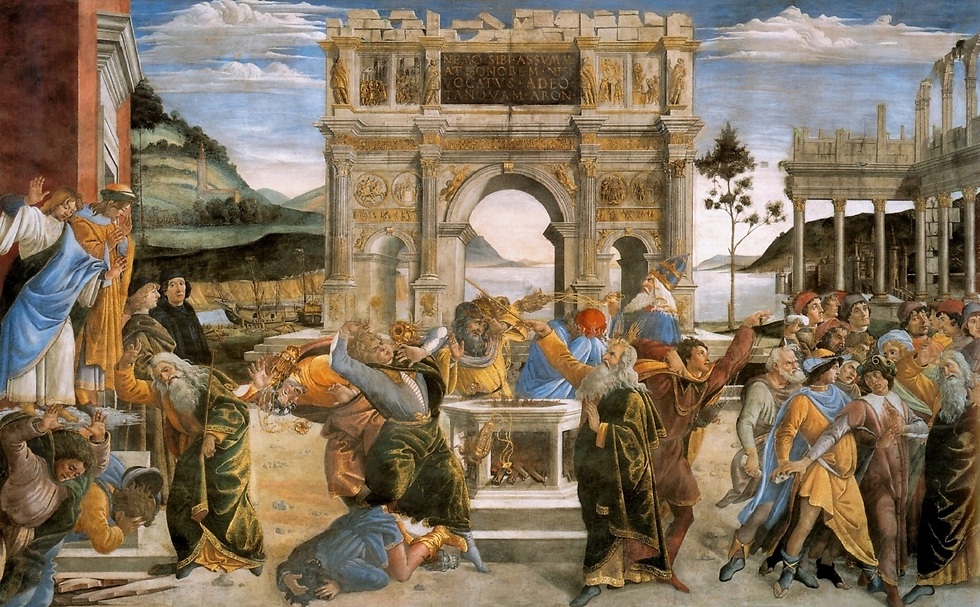
Korach, a tragic figure
Despite rebelling against Moses and Aaron and trying to seize power for themselves for entirely selfish reasons, Korach and his followers were still given a place in God’s sanctuary—to show that even those who struggle yet fail to overcome their faults still have a role to play in bringing God's light to the world.
After the unsuccessful rebellion of Korach and his followers against Moses and Aaron, the Torah tells us that, at God’s request, the fire-pans used by the rebels to bring incense offerings were hammered out into thin sheets in order to be used as a covering for the alter in the holy sanctuary. In other words, despite their sin and subsequent punishment, symbolically they still received a unique position in God’s sanctuary. Although many reasons have been offered for this rather unexpected divine command, I would like to suggest an alternative one that is based upon the difference between childish “taking” and mature “receiving and giving”. What I mean by this is as follows.
When a child enters this world, he only thinks about himself: when he’s hungry, he cries, when he wants to be changed, he cries, and so on. This is a very basic instinct that is necessary for survival. Moreover, since the newborn is solely concerned with nothing but his own needs, it can be said, somewhat jokingly, that he’s a bit egotistical. It is this behavior, where one constantly strives to satisfy his own needs yet is oblivious to those of others, that I refer to as “taking.”
Since the world would obviously be a horrible place if we all remained “takers,” proper education, Jewish or otherwise, helps change a child from a purely egotistical being to one that is concerned with the needs of others. It’s even quite possible that the actual goal of certain commandments (mitzvot) in Judaism, specifically those which obligate us to help the poor and weak amongst us, is to trigger this very transformation of one’s nature by repeatedly causing us to think about someone other than ourselves.
The Punishment of Korah and the Stoning of Moses and Aaron by Sandro Botticelli
An even loftier outlook is to recognize that anything we have received in life—fortune, God-given talents, strengths—should be used to help or touch others in order to bring more goodness to the world. Thus rather than constantly “taking” everything for ourselves like an immature child, a person with this mindset sees life as a never-ending flow of “receiving and giving.”
Although this is the ideal development for any human being, unfortunately many people remain self-absorbed takers even as adults. Hence since real meaningful living is characterized by personal/spiritual growth and expansion and a genuine concern for others, it can be said that any adult who remains closed within himself as a childish taker, even if he’s a wealthy CEO or a successful lawyer, is in a certain way already dead.
Returning to Korach, since the goal of the rebellion he led against Moses and Aaron was simply to seize the leadership and priesthood for entirely selfish reasons—the exact opposite of how Moses and Aaron utilized these positions to enlighten others and channel goodness—the Torah is informing us that despite his charisma, knowledge and public standing, Korach was still a self-absorbed “taker.” As a result he was “swallowed by the earth,” an occurrence that both literally and figuratively is associated with death.
Nevertheless and despite his faults, Korach and those he symbolizes are still God’s children. They just never succeed, for whatever reason, in transforming from childish “takers” to mature “receivers and givers." Therefore from God’s perspective Korach is most likely a tragic figure, a talented adult that still acts like a self-centered child.
Perhaps it is for this reason that symbolically Korach and his followers are still granted a place in God’s sanctuary—to teach humanity that even those who struggle yet tragically fail to overcome their inherited or acquired faults are not only precious in the eyes of God but also have a role to play in bringing God’s light to the world.
Yoel Meltzer is a freelance writer with an M.A. in Middle Eastern Studies from New York University. A former New Yorker, he moved to Israel in 1996 and currently lives with his wife and four children in Jerusalem. He can be contacted at [email protected].











